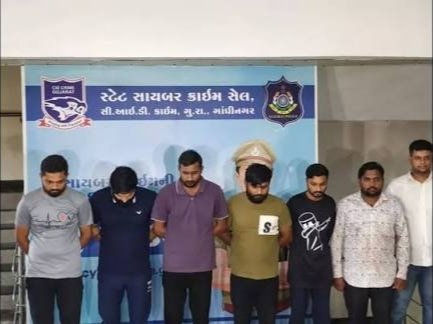GANDHINAGAR: A ₹200-crore cyber fraud ring spanning Gujarat, Dubai, and Pakistan has been uncovered by the Gujarat Cyber Crime Center of Excellence, revealing a complex money-laundering network that converted scam proceeds into cryptocurrency before sending them abroad.
A Digital Trail from Gujarat to Pakistan
What began as routine cybercrime detection in Gujarat has spiraled into one of the state’s most sophisticated cross-border fraud investigations. The Gujarat Cyber Crime Center of Excellence, working with the CID Crime Branch, has traced a sprawling network that laundered over ₹200 crore in scam proceeds through layers of mule accounts before converting the money into cryptocurrency and transferring it to wallets in Pakistan.
Officials said the investigation revealed a “seven-layer chain” of operatives stretching across Morbi, Surat, Savarkundla, and Surendranagar. At the top of this hierarchy, one suspect operated from Dubai, coordinating the final leg of the transfers and providing cryptocurrency wallet details.
“The money trail ran through Shivam Trading’s account and multiple shell firms, before being siphoned into digital currencies,” said Superintendent of Police Dr. Rajdeepsinh Zala, who led the probe.
The Spa That Was Built on Stolen Money
The inquiry began when cyber investigators stumbled upon a firm named Shivam Trading APMC during an unrelated fraud probe. The business, on paper a trading enterprise, was allegedly being used to funnel cybercrime proceeds from across India.
Among those detained were Mahendra Solanki, the firm’s proprietor, and four others — Rupen Bhatia, Maniya Rakesh, Delvadiya Rakesh, and Rakesh Laniya. Investigators seized 12 mobile phones, 2 SIM cards, and details of 100 bank accounts linked to 386 cyber fraud complaints nationwide.
Police discovered that part of the laundered funds — nearly ₹12 crore — had been invested in a local spa in Morbi. “They started the spa three months ago using ₹50–60 lakh from their share,” a senior official said, underscoring how the accused tried to mask illicit proceeds through legitimate-looking ventures.
Layered Accounts and the Crypto Funnel
The modus operandi, investigators said, involved an intricate web of bank accounts operated by “money mules” — individuals who allowed their accounts to be used for cash deposits and transfers. Funds first entered the Shivam Trading account, from which they were distributed to secondary and tertiary mule accounts.
The accused at each level withdrew or rerouted the cash, eventually consolidating it into accounts controlled by the Dubai-based handler. From there, the funds were converted into Tether (USDT), a stablecoin often used in underground financial transactions, and sent to digital wallets in Pakistan. Authorities estimate that ₹10 crore was moved to foreign wallets in just four months, with traces of at least ₹29 crore found in overseas cryptocurrency accounts.
“It’s a classic layering strategy,” said an investigator familiar with the case. “The deeper we dug, the more shell accounts emerged, each masking the origin of the money.”
A Regional Web with Global Ties
The arrests so far include six men — Mahendra Solanki and Rupen Bhatia from Morbi, Rakesh Laniya and Rakeshkumar Dekavadiya from Lakhtar, and Vijay Khambaliya and Pankaj Kathiriya from Surat. CID officials said that another key suspect, believed to be managing transactions from Dubai, remains at large.
The Gujarat team’s findings point to direct financial links between Indian mule networks and overseas handlers in Pakistan, underscoring a growing pattern of digital financial crimes that transcend national boundaries.
The case has been registered under multiple sections of the Indian Penal Code and the Information Technology Act, including provisions related to cheating, impersonation, and cyber fraud. Authorities continue to track additional wallets and accounts believed to be part of the same ecosystem.
Forensic experts say the investigation highlights an emerging trend — cybercriminals exploiting cryptocurrency’s borderless nature to launder money faster and more discreetly than traditional hawala channels.
“This is not just a Gujarat story,” one officer said. “It’s a glimpse into the global future of organized cybercrime.”


